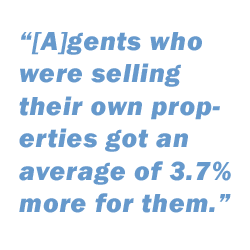|
Home ●
How to choose an agent ●
Discussion
forum ●
About
me
Unethical practices that affect
buyers:
1 ●
3 ●
4 ●
5 ●
6 ●
7 ●
8 ●
9 ●
10
|
||||||||||||||||||||||||||||||
|
The Problem
At first, my focus was on reducing real estate sales commissions. While working as an agent, though, I discovered that high commissions aren't the only problem, or even the biggest problem, facing buyers and sellers. Many agents also engage in questionable sales practices in order to boost commissions, push deals through more quickly, or use existing clients to attract new ones. Agents, for example, sometimes pressure their buyer clients to bid too much, and their seller clients to price too low. Buyers' agents sometimes steer buyers towards homes that offer higher commissions or towards their brokerages' own listings. Listing agents who have found buyers for their own listings sometimes discourage offers from rival buyers. It's also fairly common for agents to exploit their clients for referral fees, or to share their clients' confidential information in order to give their brokerages a competitive advantage. It's hard to measure how much these and other unethical practices cost clients, since they usually involve lost opportunities that are hard to quantify. But a clever economic study sheds some light on what some of them may be costing sellers.
There are, of course, some safeguards already in place against these practices. State licensing rules and federal laws outlaw some of them, and agents can be sued if they breach their fiduciary duty to look out for their clients’ best interests. Agents also have a financial incentive to please their clients so that they’ll be recommended to friends and neighbors. But these safeguards offer buyers and sellers little protection. Most agents stay under the radar by limiting themselves to abuses that are hard to detect and difficult to challenge. If you want your agent to be honest, it’s up to you to make it happen. To learn more, please click on any of the unethical practices listed in the right-hand column.
|
|
|||||||||||||||||||||||||||||
| ©Lori Alden, 2010. All rights reserved. | ||||||||||||||||||||||||||||||

